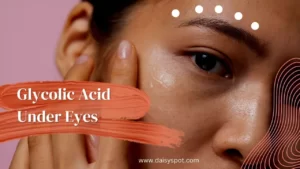Are you tired of battling acne and seeking a skincare solution that actually works? Acne can be a persistent problem, and sometimes, it feels like we’ve tried every product under the sun to get rid of those pesky pimples.
In our quest for clear, glowing skin, we often turn to various skincare products and ingredients, and one name that keeps popping up is glycolic acid. But here’s the burning question: Can glycolic acid cause acne? Let’s dig into the details of this skincare puzzle and figure out what’s true and what’s not:
Glycolic Acid: A Quick Overview
Before we delve into the acne question, let’s get to know glycolic acid a little better. Glycolic acid is a type of alpha hydroxy acid (AHA) derived from sugarcane. It’s renowned for its exfoliating properties, making it a sought-after ingredient in skincare products.
Glycolic acid works by gently removing dead skin cells, under eye dark circles, unclogging pores, and promoting skin renewal, leaving you with a smoother and brighter complexion.
Can Glycolic Acid Cause Acne?
This is the million-dollar question, right? Well, here’s the scoop:
While glycolic acid is known for its many skincare benefits, it’s generally not considered a direct cause of acne. In fact, it can help prevent breakouts by exfoliating the skin and preventing the buildup of dead skin cells that can clog pores. However, there are some important factors to consider:
1. Skin Sensitivity:
If you have extremely sensitive skin, glycolic acid may cause irritation and, in rare cases, trigger breakouts. It’s essential to start with a lower concentration and patch-test first.
2. Overuse:
Using glycolic acid too frequently or in high concentrations can lead to skin irritation, which may manifest as acne-like blemishes. Follow product instructions carefully.
3. Individual Variability:
Everyone’s skin is different. What works wonders for one person may not yield the same results for another. It’s crucial to monitor your skin’s response and adjust your skincare routine accordingly.

The Skin Connection: Glycolic Acid and Acne
Can glycolic acid cause acne? The short answer is no.
In fact, glycolic acid is often recommended for those dealing with acne-prone skin. Here’s why:
1. Exfoliation:
Glycolic acid’s exfoliating prowess helps clear away dead skin cells that can accumulate and contribute to acne. By keeping your pores clean, it reduces the likelihood of acne breakouts.
2. Oil Control:
One of the primary causes of acne is excess sebum production. Glycolic acid can help regulate oil production, preventing your skin from becoming a breeding ground for acne-causing bacteria.
3. Anti-Inflammatory Properties:
Glycolic acid possesses mild anti-inflammatory properties, which can help calm irritated skin and reduce redness associated with acne.
4. Scar Reduction:
If you’ve battled acne in the past, you might be left with stubborn acne scars. Glycolic acid can fade these scars over time, giving you smoother, blemish-free skin.

How to Use Glycolic Acid Safely?
I believe that your question regarding can glycolic acid cause acne has been answered.
Now to reap the benefits of glycolic acid without risking breakouts, follow these simple guidelines:
- Start with a low concentration (around 5-8%) if you’re new to glycolic acid.
- Patch-test a small area of skin to check for any adverse reactions.
- Gradually increase usage frequency to allow your skin to adjust.
- Use sunscreen daily, as glycolic acid can make your skin more sensitive to the sun.
- If you have sensitive skin, consult a dermatologist before incorporating glycolic acid into your skincare routine.
Conclusion
Glycolic acid is generally safe for most skin types but people are still confused about can glycolic acid cause acne. Instead, it can even help prevent acne by exfoliating the skin and unclogging pores. However, individual skin sensitivity and overuse can potentially lead to acne-like breakouts. Therefore, it’s essential to use glycolic acid cautiously, starting with lower concentrations and monitoring your skin’s response.
Remember, skincare is a journey, and what works best for you may require some trial and error. If you have concerns about using glycolic acid, consider consulting a dermatologist for personalized advice. With the right approach, you can enjoy the many benefits of glycolic acid while maintaining clear, healthy skin.
We hope this blog has clarified the mystery surrounding glycolic acid and acne. Feel free to share your thoughts or questions in the comments section below.
Happy skincare adventures!
FAQs
Does glycolic acid stop pimples?
Yes, glycolic acid can help prevent pimples by exfoliating the skin and unclogging pores, but it may not work for everyone, and other factors like skincare routine and genetics play a role in pimple prevention.
Which acid is best for acne?
Salicylic acid is often considered one of the best acids for acne as it can penetrate pores, exfoliate inside them, and reduce inflammation, effectively targeting various aspects of acne.
What to avoid when using glycolic acid?
When using glycolic acid, avoid excessive sun exposure and use sunscreen because it can increase skin sensitivity to UV rays. Also, avoid using glycolic acid alongside other strong acids or retinoids to prevent skin irritation.










